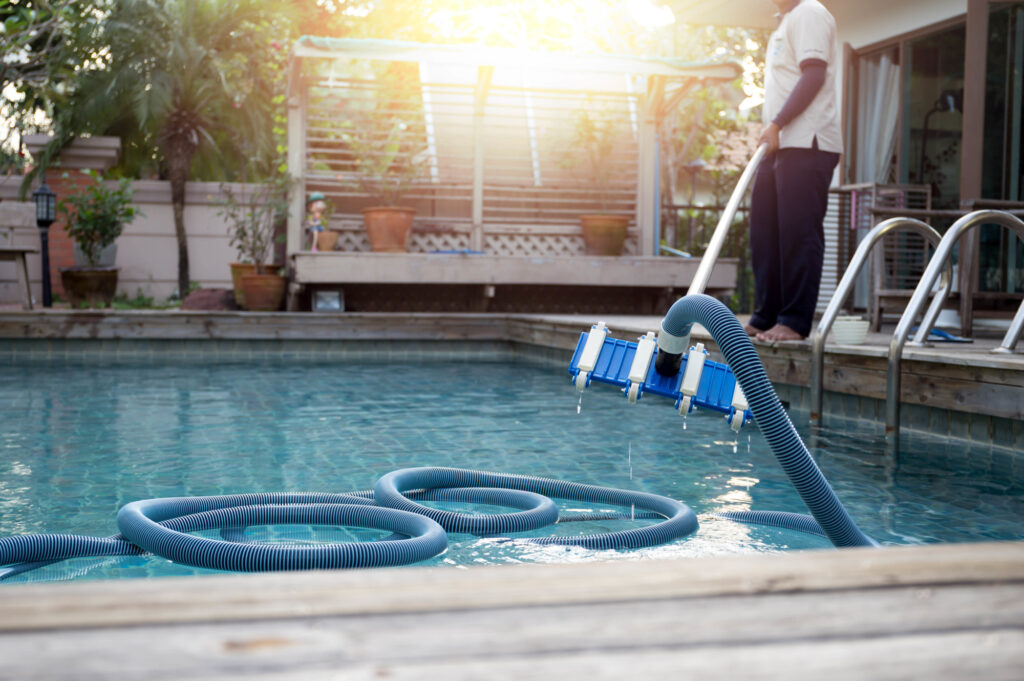
Imagine a hot summer day, the sun shining brightly, and a shimmering pool inviting you to take a refreshing dip. A well-maintained pool is not just a source of leisure; it’s a sanctuary for relaxation and recreation. However, behind that crystal-clear water lies a crucial aspect that often goes unnoticed – pool cleaning. Regular pool maintenance is not just a chore; it’s a responsibility that ensures your pool remains a safe, hygienic, and enjoyable environment. In this comprehensive guide, we delve into the importance of pool cleaning, exploring its benefits, the risks of neglect, and the various techniques that contribute to maintaining a pristine aquatic oasis.
The Benefits of Pool Cleaning
Health and Safety First: One of the primary reasons for maintaining a clean pool is to ensure the health and safety of swimmers. Unclean water can become a breeding ground for harmful bacteria, algae, and other pathogens that can lead to a variety of health issues, ranging from skin irritations to more severe respiratory infections. Regular pool cleaning helps eliminate these risks, creating a safe environment for everyone.
Water Clarity: Crystal-clear water is not just aesthetically pleasing; it’s an indication of water quality. Regular pool cleaning, including skimming and filtration, removes debris such as leaves, insects, and dirt that can cloud the water. This enhances water clarity, making swimming a more enjoyable experience.
Prevention of Algae Growth: Algae growth is a common challenge in pool maintenance. Algae not only make the pool surface slippery and unattractive but also compromise water quality. Regular cleaning and proper chemical balance prevent algae from taking hold, preserving the pool’s appearance and integrity.
Extended Lifespan of Equipment: A clean pool doesn’t just benefit swimmers; it extends the lifespan of the pool equipment as well. Debris accumulation can clog filters, strain pumps, and corrode pool surfaces. Regular cleaning minimizes wear and tear on equipment, reducing the need for costly repairs and replacements.
Cost Savings: Neglecting pool cleaning can lead to a host of issues that demand expensive solutions. From increased chemical usage to address poor water quality to repairing damaged equipment, the costs can quickly add up. Regular cleaning prevents these problems, resulting in long-term cost savings.
The Risks of Neglecting Pool Cleaning
Waterborne Illnesses: Stagnant water, especially when combined with warm temperatures, can become a breeding ground for bacteria, viruses, and parasites. These microorganisms can lead to a range of illnesses, from mild skin infections to severe gastrointestinal issues. Neglecting pool cleaning increases the risk of waterborne diseases.
Algae Overgrowth: Allowing algae to proliferate can turn your pool into an unappealing and unsanitary mess. Algae can make surfaces slippery and lead to discoloration, requiring extensive cleaning and chemical treatment to rectify.
Clogged Filters and Pumps: Debris accumulation can clog filters and strain pumps, reducing their efficiency and potentially causing them to break down. Repairing or replacing these components can be costly and disrupt the pool’s functionality.
Damage to Pool Surfaces: Debris and contaminants in the water can scratch or damage pool surfaces over time. This not only affects the appearance of the pool but can also lead to costly repairs or resurfacing.
Chemical Imbalance: Neglecting pool cleaning can result in an imbalanced chemical composition of the water. This imbalance not only affects water clarity but also makes it uncomfortable for swimmers and potentially harmful to their health.
Effective Pool Cleaning Techniques
Skimming and Vacuuming: Regular skimming and vacuuming remove floating debris and sediment from the pool, preventing them from settling on the bottom or clogging the filters.
Brushing: Brushing the pool walls and floor helps remove algae, dirt, and grime that may adhere to surfaces. This action not only keeps the pool clean but also prevents the growth of unwanted contaminants.
Filtration System Maintenance: Cleaning and maintaining the pool’s filtration system – including the skimmer basket and filter cartridges – ensures proper water circulation and efficient removal of debris.
Chemical Balance: An Austin pool cleaning business owner told me regularly testing and adjusting the pool’s chemical balance is crucial for water quality. Proper pH, chlorine, and alkalinity levels prevent the growth of bacteria and algae.
Shock Treatment: Periodic shock treatments involve adding a higher concentration of chemicals to the water to eliminate contaminants and restore water clarity. This is especially important after heavy pool usage or a period of neglect.
Conclusion
In the realm of pool ownership, the importance of regular cleaning cannot be overstated. Pool cleaning goes beyond maintaining a pleasing appearance; it’s a critical component of ensuring the health, safety, and enjoyment of swimmers. Neglecting pool cleaning invites a host of problems – from waterborne illnesses to damaged equipment – that can quickly escalate into costly and bothersome issues. By implementing effective pool cleaning techniques, such as skimming, vacuuming, and maintaining proper chemical balance, pool owners can create a pristine aquatic oasis that offers a refreshing escape on even the hottest days. Remember, a well-maintained pool is a gift that keeps on giving – providing relaxation, recreation, and joy for years to come.